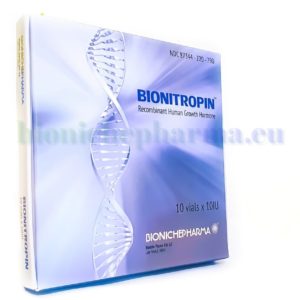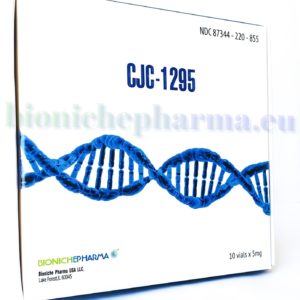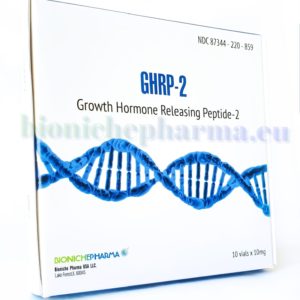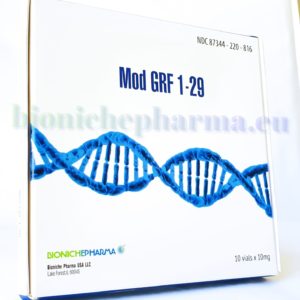Description
HGH Fragment 176-191
Description
The HGH Fragment is a modified form of amino acids 176-191 of the human Growth
Hormone (GH) polypeptide. This peptide, as the name implies, is a piece of the 191
amino chain that makes up growth hormone, from positions 176 through 191 to be
exact. This fragment has been shown to induce lipolysis, or fat breakdown, and
even inhibits lipogenesis, which is the transformation of food materials into fat
stored in the body. Research studies have shown that these happens both to
humans and to animals. This short amino-acid chain that make up Fragment 176 is
only about 10% of the length of the entire strand of growth hormone and seems to
have no other typical positive or negative effects that growth hormone does such as
actual growth of tissues or insulin resistance.
HGH Fragment (176-191) is a sterile, non-pyrogenic, white lyophilized powder
intended for subcutaneous or intramuscular injection, after reconstitution with
sterile Water for Injection.
Mechanism of Action
Investigators and scientists at several studies and researches discovered that the
fat-reducing effects of GH appear to be controlled by a small region near one end of
the GH molecule. This region consists of amino acids 176-191, and is less than 10%
of the total size of the GH molecule and appears to have no effect on growth or
insulin resistance. It works by mimicking the way natural GH regulates fat
metabolism but without the adverse effects on blood sugar or growth that is seen
with unmodified GH.
More specifically, GH cannot be used as an anti-obesity treatment due to adverse
effects:
- Fluid retention
- Diabetogenic (in high doses)
On the contrary, HGH fragment can produce ac inhibition of LPL activity in adipose
tissue and stimulate lipolysis in adipocytes. At the same time, HGH fragment
appears to have no effect on growth or insulin resistance. In that way treatment with
HGH fragment can not cause diabetogenic problems or influence the insulin
metabolism. Also HGH fragment can not cause fluid retention.
These segments of the synthetic peptides HGH Fragment (176-191) have been
investigated for their in vivo effects in laboratory mice musculus. Research results
have shown that HGH Fragment (176-191) have resulted to a short-period increase in
blood glucose and a more sustained increase in plasma insulin, together with other
fragments such as 172-191, 177-191 and 178-191. In addition, the researchers
have suggested that functionality of the peptide depends not only in the
informational sequence but should also have the correct physical configuration.
Also, this fragment, being a region of high accessibility to proteases and also rich in
praline, have been demonstrated to affect the conformational change in the
cytoplasmic domain of the band 3 of erythrocyte membrane protein by serving as
the hinge for the pivoting of the two subdomains. This then suggest that such
residue is significant in conformational changes be serving as sites for peripheral
protein binding in some body cells.
In another study on animal subjects, they found out that a 500mcg dosage of the
said hormone increased the lipolytic activity in adipose tissues without having negative
influence in the blood glucose level. Futhermore, though it behaves like a
human growth hormone (HGH), it does not causes hyperglycemia because it does
not compete with HGH receptors.
Because of such effects, researchers have suggested that it might be used for the
elimination of excess abdominal fat which is < significant aspect of HIV-associated
lipodystrophy.
Other studies claimed that protein peptide HGH fragment (176-191) actually acts on the
reduction of excessive adipose tissues (body fat) such as those in the abdominal area
and increases muscle mass while enhancing the lipid content of the body. In laboratory
tests on fat cells from humans, HGH fragment released fat specifically from obese fat
cells but not from lean ones, reduced new fat accumulation in all fat cells and
enchanced the burning of fat. HGH fragment reduces body fat in obese subjects and
enhanced fat burning without changing food consumption or inducing growth (as it dies
not increase IGF levels) or any other unwanted GH effect.
So as a conclusion, HGH fragment:
- Reduces the most stubborn abdominal fat.
- Does not negatively impact blood glucose levels.
- Increases energy expenditure.
- Cell proliferation doesn’t occur.
- Improves lipid profiles and lipolytic activity.
- Is an extremely potent and effective fat burner.
Adverse reactions
Since only the active fragment of HGH is used, there haven’t been observed any of the
adverse reactions connected with that hormone
Instructions for reconstitution
Flip off the top of the peptide vial with your thumb. Use the alcohol swab to wipe the
rubber stopper of the peptide vial. Push the needle of the syringe into the middle of the
rubber stopper so it goes through the rubber and into the vial. Now, while angling the
needle so that the water for injection goes down the side of the glass, rather than
directly into the powder, inject the water for injection into the vial. Repeat this step until
you have the correct amount of water in the vial. The powder will dissolve quickly,
however it can help to gently roll the vial in between your fingers (do not shake the vial
vigorously). Remove the syringe and dispose of it. You should never re-use a syringe.
Dosage
Recommended dosage of HGH Fragment (176-191):
- 500mcg (0.5 mg) once per day
Storage
- After reconstitution, may be stored for a maximum of 14 days in a refrigirator at 2°C — 8°C.
- Store vials in an upright position.
- Store in a refrigerator (2°C — 8°C). Keep in the outer carton in order to protect from light.
- For one month can be stored at room temperature.






Reviews
There are no reviews yet.